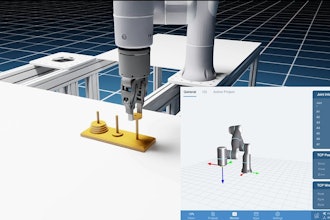
 Travis Crabtree
Travis Crabtree The manufacturing industry is growing — both in the United States and the world. More than one-tenth of the U.S. economy is driven by the manufacturing industry. In fact, U.S. factories produce almost twenty percent of global goods. Nearly ten percent of the nation’s workforce is employed by manufacturing businesses. As this is an industry that has seen substantial new business growth in the past few years (38 percent since 2016), there is certainly room for more start-ups to help meet the demand for manufacturing U.S. goods and getting some of the 2.26 trillion dollar cheese.
Do the Basics
Regardless of the industry, every new business owner has a few basic steps to go through when starting a business:
- Create a business plan that is well-researched and thoroughly lays out your strategy for your business.
- Name your business — more than just catchy, you also want a memorable moniker that will get attention in your industry.
- Apply for an EIN with the IRS - absolutely necessary for doing business in the U.S.
- File the paperwork to form an LLC, S-Corp, or C-Corp — a tax professional can help you decide which option is best for your business.
Model Behavior
Before you build your dream team, put down roots with leased property, and even print business cards. You need to have a clear standard of what you want to do. The manufacturing industry comprises so many aspects of the “middle link” of the supply chain, from the transportation of raw materials to the actual building of goods to the transportation of those products to distributors and vendors.
What will be your niche? What will you bring to the industry that will benefit other businesses enough to make you stand out from the competition? How do you plan to make money?
You absolutely need a business plan to focus your strategy for your business, but consider your business model as the “meat” of your idea.
In short, the model covers:
- How you are going to make money
- What you will actually do that will make money
- Who you will make money from/with
Network Makes the Dream Work
One of the first steps in establishing your manufacturing business is to make connections with other business owners. Creating partnerships with already established businesses is an effective way to boost your new company’s reputation and gain some experience as you grow. As your business is the “middleman,” connecting with a transport business would be a beneficial relationship for both parties, as well as your customers.
Another avenue of networking involves joining professional organizations and associations, especially your local Chamber of Commerce. These organizations foster opportunities for business owners to cultivate relationships with other business owners and potential customers. Professional associations also provide a kind of support system for small business owners beyond the networking aspect with professional guidance and helpful resources.
As Does Teamwork
“There is no ‘I’ in team” — aside from being a popular motto for sports teams, this is also a foundational truth for any manufacturing business. There are a number of successful businesses that can be operated by one person — consulting, legal and financial services, and marketing are a few examples. Any company in the manufacturing industry, however, requires a lot of hands. Regardless of how ideal your location/building is and how superb your product is, your business will undoubtedly suffer if you do not have the right team.
And Location
Where your manufacturing business is physically located is as important as who you know and what you can do. For many businesses across the board, the location can definitely make or break the company, and the manufacturing industry is no different. As much as you do not want to weigh your company budget down with a hefty lease, the inexpensive option is not always the best option.
There are a few aspects to consider when choosing the geographic location of your manufacturing business:
- Easy to find - make it easy for your customers and suppliers to get shipments to you.
- Able to handle heavy transport activity — an area with narrow streets is not the best option for delivery trucks and semis.
- Close to the action - being physically near other similar businesses (and like-minded industries)may actually aid you in finding the right skilled labor.
- Silver lining tax breaks - sometimes local and/or federal tax incentives are given to encourage business owners to settle in certain areas.
In addition to finding the most ideal location for your business, you also want the right structure(s) that can handle whatever kind of work you plan to do.
Questions to Consider:
Will your business need trucking bays?
Will you be using large machines that require ample space and need a lot of electricity?
Will you also have offices in addition to the warehouse?
The physical address and actual premises are especially important for a small business in the manufacturing industry.
After You Pass GO
Beyond the initial steps of starting a business, making your mark in the manufacturing world also requires a comprehensive understanding of other industries, in addition to your company’s industry. Because manufacturing is about turning the ingredients of a product into the product itself, it is the vital link of the supply chain. Building a successful manufacturing business means making yourself an invaluable middleman for other businesses in other industries.
Travis Crabtree is CEO of Swyft Filings.























